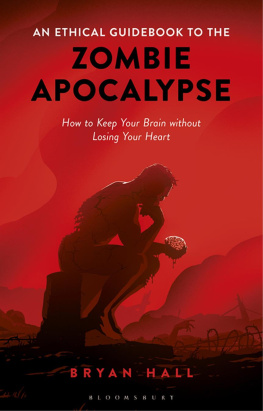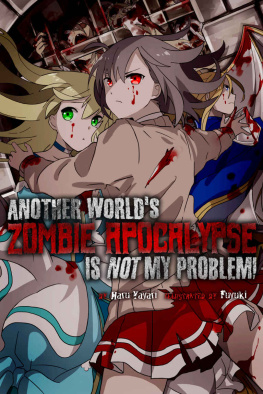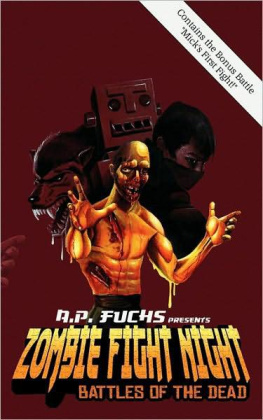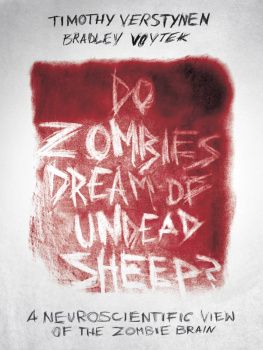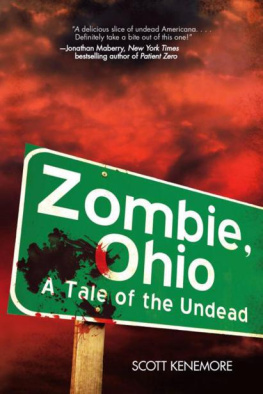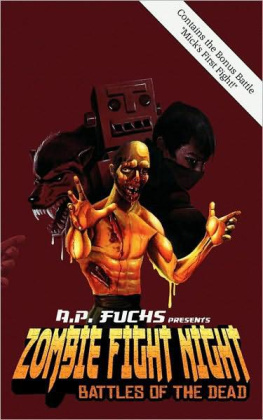AN ETHICAL GUIDEBOOK TO THE ZOMBIE APOCALYPSE
AN ETHICAL GUIDEBOOK TO THE ZOMBIE APOCALYPSE
How to Keep Your Brain without Losing Your Heart
Bryan Hall

ALSO AVAILABLE FROM BLOOMSBURY
Ethics: An Overview, by Robin Attfield
Explaining Evil, edited by W. Paul Franks
Introduction to Applied Ethics, by Robert L. Holmes
The Philosophy of Death Reader, edited by Markar Melkonian
The manuscript after which this collection is named was found at the epicenter of one of the largest viral burnouts in North America where enormous hordes of the undead converged for final death. It offers a sometimes-reliable firsthand account of the pandemic. Items found at the scene either support or challenge certain aspects of this account.
The manuscript was found on a desk in the basement of a restaurant in Mexico. The restaurant was in a small town located in the former border region between Mexico and the United States. Vast numbers of dismembered late-stage undead were found at the same location, which was otherwise abandoned. Besides the account provided in the manuscript, the identity of the author is unknown.
The title and content of the manuscript suggest that the author thought it could be used as to teach Ethics in a post-apocalyptic world. The manuscript also cites much of the philosophical literature written during this time period, literature which is highly derivative of pre-apocalyptic sources. The authors work is no exception and consistently echoes three pre-apocalyptic Ethics primers: (1) Louis Pojman and James Fieser, Ethics: Discovering Right and Wrong (Boston: Cengage, 2011), (2) James and Stuart Rachels, The Elements of Moral Philosophy (New York: McGraw-Hill, 2015), and (3) Russ Shafer-Landau, The Fundamentals of Ethics (New York: Oxford University Press, 2018).
This accountthe collected field exercisesserves as a confession of sorts, though a confession the author fails to acknowledge as their own. Given other items found at the scene that are part of this collection, it is clear that the author of the manuscript is the protagonist in the field exercises told from the first-person perspective and was at least present in the stories told from other perspectives.
To aid the reader unfamiliar with the pre-apocalyptic philosophical and zombie-cultural background of the manuscript, the archivist has added Further study sections, bolded technical terms, and created a glossary for the typescript version.
Notes on the collection
The amount of dried bodily fluid found on the manuscript and the erratic handwriting on later leaves suggest, furthermore, that the author cracked up soon after completing the text. Forensic epidemiologists discovered these items while investigating the viral burnout and delivered them to the War on Infection Archive. Full details below.
Reference Number: 26.15.13.295
Name and Location of Repository: War on Infection ArchiveDenver, CO
Title: An Ethical Guidebook to the Zombie Apocalypse Collection
Time(s) of Creation: Phase 4 through post-pandemic
Extent: Large box containing the following items:
- one robe (white, religious, unworn, folded neatly)
- two manuscripts (one handwritten, titled An Ethical Guidebook to the Zombie Apocalypse: How to Keep Your Brain without Losing Your Heart. One typescript of original with supplements)
- one map (commercially produced with handwritten notes)
- one photograph (well-worn, depicts two individuals, one middle-aged Caucasian male, other individual disfigured)
- two plush toys (one bunny and one teddy bear)
- one rope (handmade, tied into noose)
- two weapons (handmade spear, M1 Garand with single 3006 bullet)
Name of Creator: Unknown
Arrangement: In addition to the other materials found at the scene, there seems to be a relationship between the map and the content of the manuscript. The archivist has put together the following concordance relating sections of the manuscript to locations on the map following the marked path north-to-south:
Chapter 5.1: Home
Chapter 2.7: Stadium
Chapter 4.1 and Chapter 9.1: Fortress
Chapter 6.1Chapter 6.5: Canyons between Fortress and Nursery
Chapter 10.1 and Chapter 2.5: Nursery
Chapter 11.1 and Chapter 1.3: Church
Chapter 3.1: Bunker
Chapter 8.1: Location where manuscript was found
Conditions Governing Access
OPENno restrictions. Instructors thinking about using the manuscript in a class (e.g., Philosophy, Outbreak History, or Zombie Studies), however, should be aware that it contains potentially offensive content and depictions of extreme violence.
There is but one truly serious philosophical problem and that is suicide. Judging whether life is worth living or undeath worth avoiding amounts to answering the fundamental question of philosophy.
FROM THE ZOMBIE SISYPHUS
Some years ago I was struck by how many things I no longer valued that I had valued before the world fell. No longer an educator, a friend, or a spouse, I doubted those beliefs I had based on the values of my former self. I realized that it was necessary, once in the course of this apocalypse, to demolish all of my beliefs and start right from the foundation if I were to determine the value of anythingbeginning with my own life. But the task looked to be an enormous one, and as the maelstrom of violence and death further separated me from my former self, it seemed impossible that I should ever tackle such an inquiry. This led me to put off the project for so long that I now no longer know whether anyone else might benefit from my answer.
Today, and for the foreseeable future, I find myself trapped with little hope of rescue, albeit well-provisioned and secure behind steel doors and barred windows. With the exception of the undead that shroud my refuge, I am quite alone. To distract my mind from the incessant scratching and ever-growing moans, I will devote myself sincerely and without reservation to the contemplation of the question I have neglected for so long.
In the years since the outbreak, I have lost everyone I have ever known, though surprisingly few to the ravenous hordes. Any survivors who have made it this long recognize that the greatest thing they have to fear from the apocalypse is not the zombies but themselves. When not murdered by others or robbed and left to die, we too often suffer complete psychological breakdowns and/or take our own lives. As the crisis for humanity deepened, humanitys perception of itself worsened to the point that most preferred to join the ranks of the undead than remain among the living. The purpose of this book, should I be fortunate enough to finish it, is to convince the readerstarting with myselfthat life does have value.
If you are reading this book, you already know the tactics necessary to fight the undead, protect yourself from attack, and provide for your basic needs. You already know what is necessary to survive, but what many lack are the tools necessary to flourish among the undead. Without the possibility of human flourishing, however, it is difficult to see the value in remaining human. If what you do to survive undermines your capacity to flourish, it is unclear how you are different from the zombies who flourish wholly at your expense. If your existence is no better than the zombies you must constantly battle, why not give up the fight and join their ranks?
The answer to this question cannot be provided by a new martial arts move or zombie diversion tactic. It requires a special kind of reasoning, specifically
Next page
